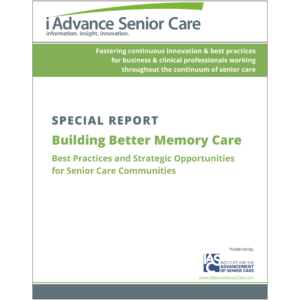Top 10 dementia care rules for nursing homes
In early November, the Centers for Medicare and Medicaid Services (CMS) outlined revisions to State Operations Manual (SOM) regulations, effective November 28, 2016, in a survey & certification memo. For nursing facilities caring for residents with dementia, the new rules have a particular bite; dementia care and cognitive impairment are mentioned over 150 times, directly impacting 10 federal deficiency tags and cross-referencing multiple others. What a perfect time to check your knowledge of the rules and ensure compliance.
Rule #10: Facility sound levels
Staff should regularly assess the hearing needs of residents with dementia to ensure that facility noise levels are comfortable (F-Tag 258). The SOM encourages facility staff to “consider if it is difficult for residents to concentrate because of distractions or background noises such as traffic, music, equipment, or staff behavior.” Cognitively impaired residents can be particularly agitated by other residents’ shouting and the blare of buzzers; reasonable efforts should be made to reduce unnecessary noise.
Rule #9: Facility policies and procedures
A list of required policies and procedures has been added to the SOM under F226. These include staff training on dementia management and the prevention of resident abuse, neglect, and (newly added) exploitation of residents with dementia. The rule states that policies and procedures should have seven components: “screening, training, prevention, identification, investigation, protection and reporting/response.” Ensure your policies are up to date by reviewing the SOM’s definitions of all seven components.
Rule #8: Activities of Daily Living (ADLs)
Residents with dementia are at risk for ADL decline when staff members perform the care instead of allowing residents to care for themselves. Cueing residents and allowing them to dress, eat, and toilet themselves takes more time, but facilities can be cited, under F310, for failing to provide the “necessary care and services to ensure that a resident's abilities in activities of daily living do not diminish unless circumstances of the individual's clinical condition demonstrate that such diminution was unavoidable.” The SOM emphasizes that staff must base ADL care on comprehensive assessments of residents’ needs and choices. Providing individualized ADL care is essential to slowing the disease process and improving quality of life.
Rule #7: Social services
Under F250, facilities can be cited when a resident with dementia lashes out at another resident and staff fail to evaluate the aggressive resident’s behavior. Resident-to-resident abuse is a huge problem in nursing homes, and your facility’s social services professionals should be integrally involved in evaluating the root cause of aggressive behaviors. Interventions should be established and continually monitored for effectiveness.
Rule #6: Activities
Have you seen the revised definition in the Activities section of the SOM (F248)? Pay close attention to the new language (in italics):
The facility must provide, based on the comprehensive assessment and care plan and the preferences of each resident, an ongoing program to support residents in their choice of activities, both facility-sponsored group and individual activities and independent activities, designed to meet the interests of and support the physical, mental, and psychosocial well-being of each resident, encouraging both independence and interaction in the community.
Ask yourself: does your facility’s activities program actively provide the items listed above? The SOM instructs surveyors to look for activity programming that assesses the time of day when behavioral symptoms are observed prior to escalation. Cognitively impaired residents with behavioral symptoms benefit from programming that includes observation, planning, implementation, and evaluation of the results.
Rule #5: Proficiency of nursing assistants/staff
Competency of staff to care for cognitively impaired residents is in surveyors’ bull’s-eye. Facility staff must ensure that “nurse aides are able to demonstrate competency in skills and techniques necessary to care for residents’ needs, as identified through resident assessments, and described in the plan of care.” In F498, the SOM mandates that staff competency assessment “include dementia management training and resident abuse prevention training.” This is a repeat of language in F226, Policies and Procedures (described above), so citations in one tag could lead to a cross-referenced citation tag.
Additionally, F361 requires:
The facility must employ sufficient staff with the appropriate competencies and skills sets to carry out the functions of the food and nutrition service, taking into consideration resident assessments, individual plans of care and the number, acuity and diagnoses of the facility’s resident population in accordance with the facility assessment.
F361 also includes behavioral health services requirements that must be implemented by November 28, 2017.
Rule #4: Dignity
F241 details privacy during care, covering of catheter bags in public, and much more that should be considered. Surveyors will also observe whether “staff members respond in a dignified manner to residents with cognitive impairments, such as not contradicting what residents are saying.” Under this F-Tag, the SOM encourages staff to look behind behaviors to underlying desires. If a resident is trying to leave the facility, staff should seek to understand why. She may be trying to meet the school bus as if still a young mother. Staff should ask her about her children rather than tell her that her children are grown.
Rule #3: Unnecessary drugs
It goes without saying that F329 focuses on whether medications ordered to treat conditions are being “monitored for effectiveness and for adverse consequences, including whether any symptoms could be related to the medications.” For residents with dementia, the SOM added that facility staffing should be arranged to “optimize familiarity and consistency for a resident with symptoms of dementia” as a nonpharmacologic intervention. Oversight of medication regimens by consistent staff who know their residents is an effective approach to avoiding unnecessary-drug citations.
In the most significant change to this section, effective November 28, 2017, residents are not to receive PRN antipsychotic medications unless for a specific, documented diagnosis. PRN orders for psychotropic drugs must not be given beyond 14 days without the prescribing practitioner documenting the rationale. Time frames for continued PRN use must be documented in the medical record.
Rule #2: Quality of care
The 61 pages of instruction to the surveyors in F309, Quality of Care, deserve a thorough review by facility staff. In this section, CMS provides an overview of dementia and behavioral health and defines behavioral intervention, person-appropriate care, and appropriate medication use in residents with dementia.
Rule #1: Facility assessment
Finally, the most significant change to the SOM is the new requirement for every nursing home to develop a comprehensive facility assessment by November 28, 2017. In F490, Administration, facilities “must conduct and document a facility-wide assessment to determine what resources are necessary to care for its residents competently during both day-to-day operations and emergencies.” By definition, the facility plan must include the facility’s dementia management programs. After analyzing their resident population, facility leaders must detail residents’ needs, required staff competencies, physical environmental needs, emergency response and much more.
Conclusion
These top 10 F-Tags were chosen because the SOM connects them to care of residents with dementia, and so should we. Reviewing the regulations thoroughly not only will help you understand what surveyors are looking for so that your facility can avoid fines and citations, but will also uncover a wealth of information to help you better care for your residents. Link to the CMS survey & certification memo and start digging in today!
 Judi Kulus, MSN, MAT, RN, NHA, DNS-CT, RAC-MT, is Vice President of Curriculum Development for the American Association of Nurse Assessment Coordination (AANAC).
Judi Kulus, MSN, MAT, RN, NHA, DNS-CT, RAC-MT, is Vice President of Curriculum Development for the American Association of Nurse Assessment Coordination (AANAC).

I Advance Senior Care is the industry-leading source for practical, in-depth, business-building, and resident care information for owners, executives, administrators, and directors of nursing at assisted living communities, skilled nursing facilities, post-acute facilities, and continuing care retirement communities. The I Advance Senior Care editorial team and industry experts provide market analysis, strategic direction, policy commentary, clinical best-practices, business management, and technology breakthroughs.
I Advance Senior Care is part of the Institute for the Advancement of Senior Care and published by Plain-English Health Care.
Related Articles
Topics: Articles , MDS/RAI











